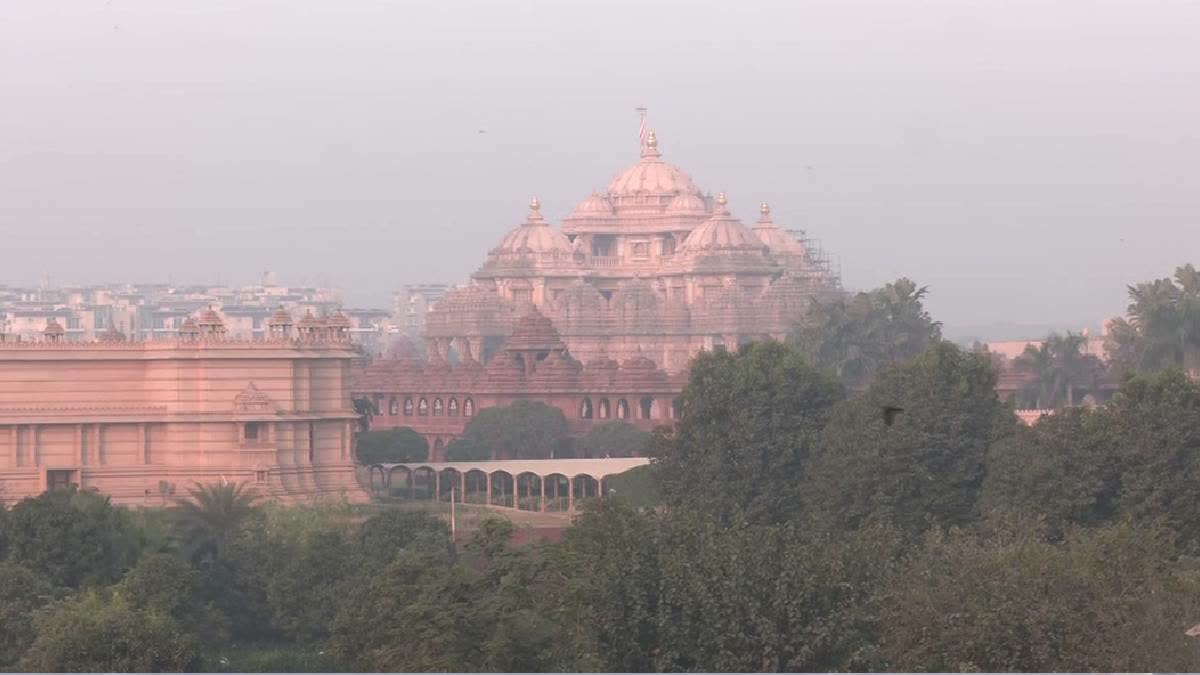New Delhi:A day after the Diwali festivities, Delhiites found themselves in a gas chamber, literally. Diwali revellers gave two hoots to regulations as firecrackers were rampantly bursted in several areas including Lajpat Nagar, Kalkaji, Chhatarpur, Jaunapur, East of Kailash, Saket, Rohini, Dwarka, Punjabi Bagh, Vikas Puri, Dilshad Garden, Burari and many other neighbourhoods of east and west Delhi.
As a result, air pollution levels in Delhi-NCR on Friday deteriorated further to the 'very poor' category with a blanket of toxic smoke engulfing the whole region. According to the Central Pollution and Control Board CPCB, the average air quality index (AQI) in the capital Delhi till 7:30 a.m. remained at 361.
Delhi also recorded its most polluted Diwali in three years. Most areas in the capital recorded an Air Quality Index (AQI) over 350, raising health concerns for residents. The AQI was 353 in Alipore, 395 in Anand Vihar, 387 in Ashok Vihar, 392 in Bawana, 395 in Burari Crossing, 395 in Chandni Chowk, 371 in Mathura Road, 372 in Dr Karni Singh Shooting Range, 375 in IGI Airport, 334 in ITO, 390 in Jahangirpuri, 343 in Jawaharlal Nehru Stadium, 314 in Lodhi Road, 374 in Mundka, 329 in Najafgarh, 385 in Nehru Nagar, 390 in North Campus, 352 in Dwarka, 369 in Okhla Phase 2, 392 in Punjabi Bagh, 388 in Shadipur, 395 in Sonia Vihar, 314 in Sri Aurobindo Marg, and 389 in Wazirpur.
At around 7:00 am, Anand Vihar recorded an AQI of 395, Aya Nagar stood at 352, Jahangirpuri at 390, and Dwarka reached 376. All these areas reported 'very poor' air quality levels, posing significant health risks. Cyclist Stephen, passing through India Gate where the AQI stood around 317 post-Diwali, said, "Because of the pollution, terrible things are happening. The pollution came on very suddenly this time. Just a few days ago, there was nothing, and now my brother has fallen sick. I used to come here to cycle with my brother, but he has been severely affected by the pollution lately. And today, the pollution is extreme."
He added, "There were so many fireworks and other things yesterday that I couldn't even sleep. We've been really troubled; my brother is in terrible shape. What else can we do? It's taking a toll on his body--his throat hurts, it's hard to breathe, he has a cold, and his eyes are irritated. There's so much; we don't even know everything that's happening. While cycling, it's hard to keep our eyes open."
"I came here to go cycling, but now it's a big problem. There's a lot of coughing, and I'm having trouble cycling. This pollution is much worse, especially due to the fireworks, bombs, and kids playing with firecrackers. It's even affecting vehicles, and it's really bad. It could lead to cancer or other serious illnesses," another cyclist, John, told ANI.
The pollution issue wasn't limited to Delhi; several other cities across India, including metropolises like Chennai and Mumbai, reported similar conditions, with smog and poor air quality affecting large areas. The CPCB data shows significant pollution levels, especially after Diwali celebrations, raising concerns about air quality and potential health impacts nationwide.
Earlier on Thursday, Delhi Environment Minister Gopal Rai spoke about the preparations the Delhi government was implementing post-Diwali. "The Air Quality Index (AQI) in Delhi remains in the 'very poor' category, with some areas showing extremely high levels. With Diwali tonight, it's an important night for Delhi and its people. I request everyone to avoid burning crackers to help control pollution across the state. Delhi's air quality remains 'very poor.' Today being Diwali, tonight is critical for us. Let's celebrate by lighting diyas and sharing sweets, but we must avoid crackers to protect the children and elderly at home," he was quoted as saying by news agency ANI.
Gopal Rai further stated, "I believe that if the people of Delhi avoid burning crackers, the city will not witness the usual post-Diwali smog. I request everyone to avoid crackers and the pollution they cause, to ensure everyone at home remains safe."
When asked about the selling of crackers in the city, the Delhi Environment Minister mentioned that Delhi Police would increase patrolling at night to monitor the situation. "The police are actively working to control the sale of crackers. Patrolling will be increased at night for safety. But I still ask, why is it necessary to burn crackers? As human beings, it's our duty not to pollute the city," he underlined.
Gopal Rai also shared that the Delhi government is monitoring the situation closely. "We are addressing incidents of firecracker use, and the police are working on this on the ground. Such activities at night will also be addressed. But more than enforcement, it's our duty to protect our environment. We are monitoring everything, and the Delhi government will take necessary steps as the situation demands," he added.
Delhi records over 300 fire-related incidents on Diwali
The Delhi Fire Service (DFS) received over 300 calls reporting fire-related incidents on Diwali, though no life-threatening cases were reported, an official said on Friday. Delhi Fire Services Director Atul Garg said that between midnight and 6 am, approximately 158 fire-related incidents cases were reported.
"There were no major calls but we received many. From 5 pm yesterday until midnight, around 192 calls were logged, and between midnight till 6 am around 158 more were reported.
From 5 PM to 5 AM, in just 12 hours the 300 mark was crossed," Atul Garg said. He further said that there was no major fire as they had increased the fire force this year for Diwali. "There were minor fire incidents, including one in Vikaspuri where two people became unconscious. Another incident was reported in Mangolpuri, where a woman and two children were injured.
AQI 'poor', 'very poor' in several parts of Haryana, Punjab
